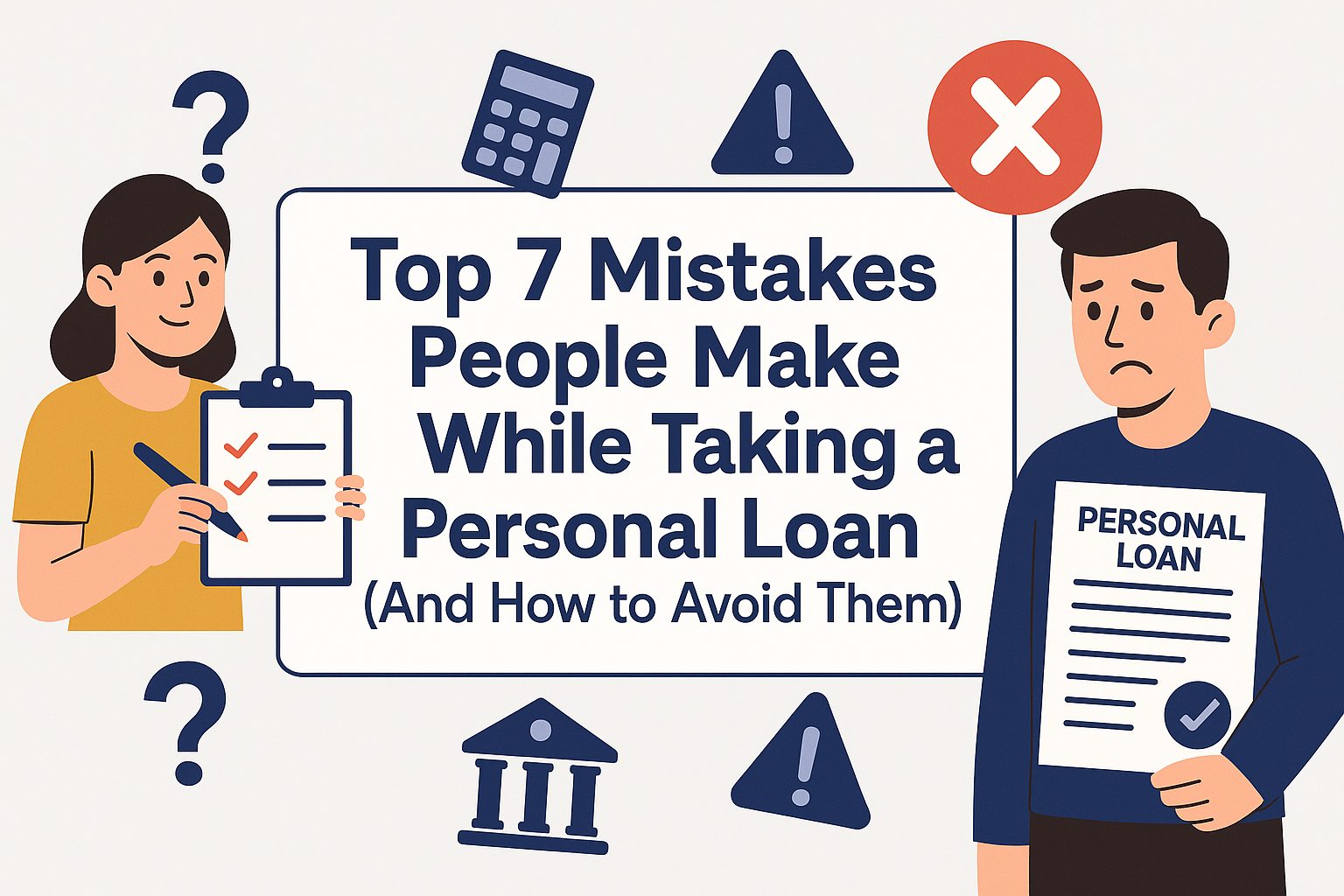Top 7 Mistakes People Make When Taking a Loan — And How to Avoid Them
Getting a loan can feel like a lifesaver when you’re short on cash, need to cover an emergency, or want to finance something important. But borrowing money isn’t just about getting approved—it’s about borrowing smart.
Many people rush into loans without fully understanding the terms, and that often leads to debt traps, hidden fees, and financial stress. If you’re thinking about taking a loan in 2025, avoid these 7 common mistakes—and save yourself money and regret down the road.
⚠️ Mistake #1: Not Comparing Loan Offers
Too many borrowers accept the first offer they get, either from their bank or a flashy online app. But interest rates and fees can vary wildly between lenders.
✅ What to do instead:
- Compare offers from banks, NBFCs, and digital lenders.
- Check not just interest rates, but also processing fees, penalties, and hidden charges.
- Use comparison websites or aggregator apps to simplify the search.
💡 Pro Tip: Even a 2% difference in interest can save you thousands over the loan term.
💸 Mistake #2: Borrowing More Than You Need
It’s tempting to take a little extra “just in case,” especially when pre-approved offers are quick and easy. But remember—you pay interest on every rupee you borrow.
✅ What to do instead:
- Borrow only what you need—not what you want.
- Avoid treating loans like free money.
- Calculate the EMI carefully to make sure you can manage it.
📉 Borrowing less keeps EMIs lower and your credit score healthier.
📄 Mistake #3: Ignoring the Fine Print
People often skip reading the full loan agreement. That’s where lenders include hidden fees, prepayment charges, and penalty clauses you might not notice until it’s too late.
✅ What to do instead:
- Read the entire loan agreement before signing—even the small print.
- Ask the lender about foreclosure rules, late payment fees, and bounce charges.
- Check for processing fees—usually 1% to 3% of the loan amount.
💡 If anything is unclear, ask in writing. Verbal promises don’t count.
📉 Mistake #4: Not Checking Your Credit Score First
Your credit score affects your eligibility, interest rate, and loan amount. A low score means higher interest or outright rejection.
✅ What to do instead:
- Check your credit score before applying (use services like CIBIL, TransUnion, or Tasdeeq).
- Fix errors or clear dues that are hurting your score.
- Don’t apply to multiple lenders at once—it can lower your score.
🧠 Better score = better offers and bigger savings.
🏃 Mistake #5: Rushing Into High-Interest Short-Term Loans
Payday loans or “instant approval” apps often come with insane interest rates (sometimes over 30% annually). They’re easy to get—but very hard to repay.
✅ What to do instead:
- Avoid lenders that offer instant money with no credit check—it’s usually a trap.
- Go for regulated lenders like banks or well-known NBFCs.
- Check the APR (Annual Percentage Rate)—this gives the full cost of the loan, including fees.
⛔ Quick loans aren’t always cheap loans.
⏳ Mistake #6: Not Having a Repayment Plan
Many borrowers focus only on getting the loan—not how they’ll repay it. Missed payments hurt your credit, add penalties, and lead to debt spirals.
✅ What to do instead:
- Make sure the EMI fits your monthly budget.
- Set up auto-debit so you never miss a payment.
- If your income is unstable, avoid long-term commitments.
💡 Also keep a small emergency fund in case of job loss or health issues.
💰 Mistake #7: Paying Only the Minimum (Or Making Late Payments)
Missing even one EMI can lead to:
- Late fees
- Extra interest
- Credit score damage
✅ What to do instead:
- Always pay your full EMI on time.
- If you can, prepay a part of the loan when you get bonuses or extra income.
- Check if there’s a penalty-free window for partial payments.
📊 Paying a little extra each month can reduce interest and close your loan faster.
🧮 Bonus Tip: Use a Loan Calculator Before You Apply
A loan EMI calculator helps you:
- Plan your monthly payments
- Understand total interest you’ll pay
- Adjust tenure and amount based on your budget
Try different combinations and pick the most manageable one.
🛡️ Final Thoughts: Borrow Smart, Not Fast
Loans aren’t bad—but bad borrowing is. If you treat loans like easy money, you’ll end up in long-term debt. But if you plan well, compare options, and repay responsibly, a loan can actually improve your financial health.
Key things to remember:
- Always compare multiple offers
- Know your credit score
- Read the terms before signing
- Borrow only what you can afford to repay
Being financially smart today will protect your future tomorrow. Don’t rush—think, compare, and borrow wisely.









Post Comment